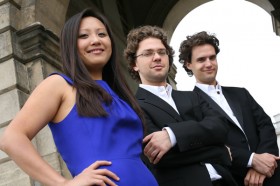Bermuda Festival Review: Sitkovetsky Piano Trio
A heartfelt evening of music making was realized by the Sitkovetsky Piano Trio at the Earl Cameron Theatre, City Hall with their only performance with this year’s Bermuda Festival.
Though lacking the sense of adventure and inspiring musicality that nuanced the opening performance of Duo Amal that avoided any and all stereotypical perceptions of classical music, violinist Alexander Sitkovetsky, pianist Wu Qian, and cellist Leonard Elschenbroich delivered an impressive, though in some ways predictable, evening of challenging and rich chamber music.
Opening with Haydn’s Piano Trio No.39 in G Major, Gypsy, the musicians brought to life a sophisticated composition with ample sensitivity for the subtle dynamics that can be enjoyed by a trio.
Though wonderfully unique to this work of Haydn’s is the finale “Rondo in the Hungarian (Gypsy) Style”, one of many works to be influenced by “Gypsy” music, but one of few to actually notate that influence.
The trio ensured that the finale shone with its “Gypsy” influence, allowing the allusions to the refreshing sincerity of the Hungarian form to bolster their performance.
Next to offer in the program was a dramatic and expansive piece from Brahms that at times made this reviewer forget that he was listening to three instruments.
Brahms’ Trio No 2 Op 87 in C major took the audience through four varied movements of great depth and breadth that demanded skilled playing from the musicians.
Mr. Elschenbroich breathed a beautiful, soaring sorrow into the third movement carried heavily by himself, with the finale back to the adventurous and light mood that characterized the previous movements of the piece, accented by the powerfully effortless playing of Ms. Qian.
After the intermission the trio took on Dvorak’s Piano Trio No. 3 in F minor, a conflicting and at times wild but certainly sincere piece colored by an unmistakable tone of grief, supposed by some to have been written as a means for the composer to come to terms with the then recent passing of his mother.
Of note was the second movement set-down in a compelling 2/4 that allowed that musicians to drive the piece forward and explore the conflicting passions of a grief-stricken spirit, with heavily accented beats and cross rhythms that seemed to spring out of each other.
An evocative moment of juxtaposition took place with the transition of the second movement into the third, with the soul of the piece revealing itself as if Dvorak was laying himself bare to his ordeal and accepting the reality of his loss, driving the point home with a rich melody handled flawlessly by Mr. Sitkovetsky.
The Sitkovetsky Piano Trio performing in London in 2011:
Rounding off the piece was the finale, returning again to the familiar energy of the first two movements, unmistakably accented though by a sense of spirited resolution.
The night ended, of course, with the trio heralded back to the stage for an encore and a standing ovation from a strong modicum of the audience.
Spirited, skilled, and heartfelt can definitely sum up this performance, though in many ways an evening of classical chamber music that operated within expected boundaries, the trio definitely demonstrated why they were included in this year’s line-up of the Bermuda Festival.
Read More About
Category: All, Entertainment, Music


